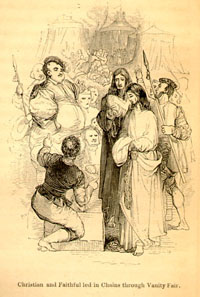 Christian & Faithful in Chains |
FROM HOME TO THE WICKET GATE THE PALACE BEAUTIFUL APOLLYON VANITY FAIR & FAITHFUL'S MARTYRDOM THE GIANT DESPAIR INTO THE CELESTIAL CITY |
In a large percentage of 19th-century American homes, John Bunyan's allegorical narrative about a "Christian" going to salvation occupied a place right next to the family Bible. It is the book John gives Ellen to display his love in The Wide, Wide World. It is the book Marmee gives to each of the March girls for Christmas at the beginning of Little Women. It is even the book Huck Finn tries to read during his stay at the Grangerfords'.
Pilgrim's Progress was, at least in some respects, the model for Stowe's narrative. As Huck says, it is "about a man who left his family." Like Uncle Tom's Cabin (in which it is mentioned four times), Bunyan's story is organized as a journey from home to heaven. Christian's experiences and temptations on the way Bunyan describes often anticipate scenes in Tom's journey. About a third of Pilgrim's Progress is available here, in a text based on the ones that were available to Americans in Huck and Stowe's time.
 Christian & Faithful in Chains |
FROM HOME TO THE WICKET GATE THE PALACE BEAUTIFUL APOLLYON VANITY FAIR & FAITHFUL'S MARTYRDOM THE GIANT DESPAIR INTO THE CELESTIAL CITY |
The full title of Bunyan's book is The Pilgrim's Progress From This World to That Which Is to Come: Delivered under the Similitude of a Dream Wherein in Discovered, The Manner of His Setting Out, His Dangerous Journey; and Safe Arrivalat the Desired Countrey. It was originally published in London, in 1678. The text here is based on one initially transcribed by C.E.K. at the Cardinalis Etext Press, as converted to HTML by Jim Milligan and Harry Plantinga for the Christian Classics Ethereal Library, at Wheaton College. They used an 1853 edition, published by Derby and Co. in Buffalo; as these excerpts were retagged for this site, their text was compared with two additional American editions from the 1850s.
